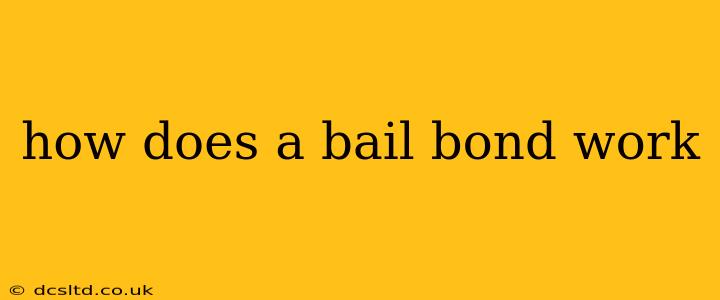How Does a Bail Bond Work? A Comprehensive Guide
Getting arrested and facing bail can be a confusing and stressful experience. Understanding how a bail bond works is crucial during this time. This guide breaks down the process, explaining the roles of different players and answering common questions.
What is Bail?
Bail is a sum of money paid to the court to secure the release of a person who's been arrested and charged with a crime. It's essentially a guarantee that the accused will appear for all scheduled court hearings. If the accused fails to appear, the bail money is forfeited to the court.
How Does a Bail Bond Agent Fit In?
This is where a bail bond agent comes in. Instead of paying the full bail amount yourself (which can be substantial), you can hire a bail bondsman. They will post the bail on your behalf for a fee, typically 10-15% of the total bail amount. This fee is non-refundable, regardless of the outcome of the case.
The Bail Bond Process, Step-by-Step:
-
Arrest and Bail Setting: After an arrest, a judge sets a bail amount based on the severity of the crime, the defendant's criminal history, and the risk of flight.
-
Contacting a Bail Bondsman: Once the bail is set, you or your family can contact a bail bond agent. They'll require some information about the arrested individual and the charges.
-
Collateral: The bail bondsman will usually require collateral to secure the bond. This could be a house, car, or other valuable assets. If the accused fails to appear in court, the bail bondsman can seize the collateral. In some cases, they may only request a co-signer who agrees to be financially responsible if the accused skips bail.
-
Bond Posting: The bondsman posts the bail with the court on your behalf. This allows for the immediate release of the arrested individual.
-
Court Appearances: The accused is legally obligated to attend all court appearances. Failure to do so will result in the forfeiture of the bail and potential legal repercussions for both the accused and the bondsman. The bondsman may then pursue the collateral to recover their losses.
-
Case Resolution: Once the case is resolved, the bail is returned (minus the bail bond fee) if all court appearances were made.
Frequently Asked Questions (PAA):
What happens if you can't afford bail?
If you cannot afford bail, you will remain in jail until your court date. You can explore options like seeking legal aid to explore other possibilities, including applying for a public defender or requesting a bail reduction.
How much does a bail bond cost?
The cost of a bail bond is typically 10-15% of the total bail amount. This is a non-refundable fee. Additional fees may apply depending on the circumstances.
Can I get a bail bond for a misdemeanor?
Yes, bail bonds are available for both misdemeanor and felony charges, although the bail amount and the process might differ depending on the severity of the crime.
What happens if the defendant doesn't show up to court?
If the defendant fails to appear in court, a warrant will be issued for their arrest. The bail bond agent will attempt to locate the defendant and bring them to court. Failure to appear can result in the forfeiture of the bail and potentially legal action against the defendant and any co-signers.
What is the difference between a bail bond and a surety bond?
While both involve securing a financial obligation, a bail bond is specific to criminal cases, guaranteeing court appearance. A surety bond guarantees the performance of a contract or agreement.
Disclaimer: This information is for educational purposes only and should not be considered legal advice. Consult with a legal professional for specific advice regarding your situation. Laws regarding bail and bail bonds vary by jurisdiction.
